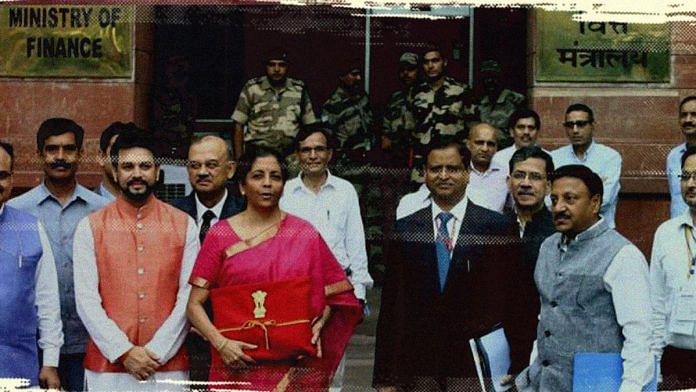The finance ministry under the Modi government has barred entry of all journalists, including PIB accredited, in the North Block without prior appointment. Finance Minister Nirmala Sitharaman met a group of journalists Tuesday and later tweeted a “clarification”, saying “these procedures are part of overall efforts… to make reporting for media persons hassle free and convenient”.
ThePrint asks: Should journalists get unrestricted access to govt offices or has media become too invasive?
Move particularly striking because previous finance minister Arun Jaitley was media friendly
 Sevanti Ninan
Sevanti Ninan
Founder editor, The Hoot
This new curb is neither about tackling unrestricted access nor about the media becoming too invasive, because it is not something being implemented across the board in the Modi government’s second term. It is the initiative of a single ministry, which happens to have a new minister.
The PIB accreditation gives access to journalists who have been pre-screened to enter ministries, collect information they need, and chat up officials willing to talk to them. The access has been in place for decades for most ministries except for a few sensitive ones.
When a ministry changes the rules to say that journalists should get access to its corridors only by prior appointment, it is trying to plug background briefings of beat reporters by ministry officials they know. This way officials are instantly identifiable as being the source of a particular news report. They will be constrained to say as little as possible.
In this case, it is particularly striking because the previous finance minister Arun Jaitley was known to be media friendly and held regular briefings with ministry reporters. Nirmala Sitharaman evidently has a very different attitude to beat reporters, judging by this new diktat.
Reasons are not confidentiality alone – it is also a matter of work culture and work-place discipline
 Sandip Ghose
Sandip Ghose
Marketing executive and political commentator
I am amused by the controversy surrounding restriction on entry of journalists in the Finance Ministry. It took me back to my corporate days in 1990s, when I was a young manager at one of the leading multinationals.
After leaks of marketing plans to another MNC competitor, the Chairman at the time (who later went to become a Padma Bhushan and ultimately a Rajya Sabha MP) came down heavily on visitor entry.
Before that, the Churchgate head office of this iconic company was like the platforms at Victoria Terminus – with suppliers, ad agency executives and sundry vendors freely loitering between the floors. Understandably, there was pushback from various departments.
A couple of months ago, I was invited to the company’s new corporate campus for an alumni get-together. I discovered that my alma mater has moved to an open-office concept for all, including the Chairman. Visitors are now met in a long sky-lit walkway between two blocks.
The justification for restricting entry needs no elaboration. The reasons are not confidentiality alone – it is also a matter of work culture and work-place discipline. Smartphones have further compounded the risks.
On the question of access to sources – surely secrets do not get discussed in office in these days of hi-tech vigilance.
Life moves on. So should the media. Perhaps, Nirmala Sitharaman can take a leaf out of the example of the corporate mentioned above and, instead of a “street”, create a replica of Khan Market middle-alley with coffee-shops.
Also read: Sedition, defamation, blocking public servant: Laws ‘misused’ to crack down on journalists
Modi govt sees election wins as something that should trigger five years of unquestioning obedience
 Abhinandan Sekhri
Abhinandan Sekhri
Co-founder & CEO, Newslaundry
It is true that the media is becoming more invasive, but the government too has become increasingly invasive, as has the technology. Invasive is the new normal. So, it is in this context that the Indian media is currently operating. It is no outlier.
While I don’t think journalists should be given unrestricted access, that isn’t what the demand is in this case involving Finance Minister Nirmala Sitharaman.
In a democracy, there has to be a healthy interaction and exchange of information between citizens and the government. Media happens to be the pipeline (Twitter accounts and Mann Ki Baats don’t count) where citizens get to know what their government is up to. There is a tendency among governments, especially the Modi government, that sees victory in elections as something that should trigger five years of unquestioning obedience.
The news media is an important element of democracy, which seeks accountability daily. But the typically feudal mindset of politicians prevents them from seeing that. Thus, the relationship between the government and the media has become that of enemies at worst and adversaries at best. Ideally, it should be a relationship of equals who challenge each other.
In this context, the ministry’s clarification that this measure will “make reporting for media persons hassle free and convenient” becomes irrelevant. Another worrying aspect is that the move will help the government keep a track of which journalist is seeking appointment with which official. This will, in effect, lead to less information dissemination and more opacity.
Also read: Will Nirmala Sitharaman make a good finance minister?
Modi govt was bound to restrict access after media’s agenda against BJP & pro-Hindutva leaders
 Arun Anand
Arun Anand
CEO, Indraprastha Vishwa Samvad Kendra, and author of ‘Know About RSS’
The role of the fourth estate in a democracy is to act as the watchdog. To do that effectively, it needs to be without bias, impartial and objective. Indian media’s credibility has never been so low as it is now but the industry has itself to blame.
A section of the media has carried out an agenda-driven journalism against the BJP as if it was their mandate to stop the party from coming to power. Objectivity became the first victim of this tirade against the BJP and pro-Hindutva politicians.
This kind of ‘Yellow Journalism’ was neither opposed nor condemned by the torchbearers of this profession. Instead, there was a deafening silence, which effectively meant silent approval of these tactics. This resulted in huge erosion of the media’s credibility in India.
In an atmosphere like this, the Narendra Modi-led government starting its second term is bound to be apprehensive about giving unrestricted access to the journalists to North and South Blocks. The restrictions placed by the Union finance ministry seem to be an outcome of this apprehension.
More than complaining against the Modi government, it is time for the media to set its own house in order by identifying the ‘black sheep’ who are using its platform to drive their own political agenda. No one can restore the credibility of the fourth estate except the fourth estate itself. And once this credibility is restored, the issues of controlling the access for media should get resolved permanently.
By Fatima Khan, journalist at ThePrint.




Sadly, the media has completely abandoned its commitment to ascertain the truth of a report and its capacity ( or willingness?) to ask questions of clearly mendacious leaders, who spew blatant lies and false allegations with as little compunction as they spit their Paans. How did Rahul’s Rafale get so much steam in the media without their happily ‘reporting’ verbatim whatever he said without any effort to point out how utterly false it all was? In one word, the profession has turned ‘irresponsible’.
To Mr Sekhri’s point that Twitter accounts don’t count. Hello? I’m a citizen and I trust these accounts way more than the country’s agenda-driven left liberal media. It’s so condescending of him to decide on our behalf and talk down to us from his pulpit as to what is or is not good for me. Just the type of elite arrogance that has made billions like me disillusioned with this lot.
I also think that he has got his point about feudal politician mindsets upside down. I think that for all these 50/60-something ministers in the government to embrace the latest information dissemination tech is very modern and progressive and the opposite of feudal.
On the other hand it’s this forcible imposition of traditional journalists as controllers of information that is feudal and outdated. As a citizen I owe these journalists nothing, especially given that their real agenda is to hate on one politician.
The media represents the majesty of ordinary citizens in a democracy, most of all their right to know what is happening in public spaces, ask searching questions, shine unforgiving light on dark recesses, nooks and corners. The RTI Act is one of UPA’s stellar achievements. File notings, the heart of decision making in government, are accessible to the public. As are Cabinet papers, once the decision has been taken. Viewed against that impulse for transparency, what possible harm can an accredited journalist cause by dropping in for a cup of sarkari chai and a friendly chat with a mandarin. After the Pentagon Papers judgment of the US Supreme Court, a journalist ferreting out classified information – barring something whose disclosure may actually harm national security, rigidly defined – acting in utmost good faith is performing a public service and her professional duty. Keeping her out raises questions, doubts, misgivings …
What you say may be correct, if Barkha kind of people collect information to pass on with a specific agenda of maligning and targeting someone. Media has not been unbiased and have always their view to be heard. If they are the messengers for common people, they should be more responsible than infusing their biased thoughts in the minds of ordinary citizens. So long they carry their hidden agenda and most of them are paid journalists, the suspicion is always bound remain. Right to know has its own limitations. It should not be like live telecasting terrosits actions for their own TRP in a way giving publicity to offenders. The day media behaves responsibly, there can be healthy discussion.